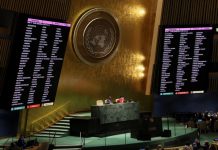Armenia and Azerbaijan signed a Russian brokered peace treaty on Monday to end the Nagorno-Karabakh war which resulted in a six week battle between the two countries with over dozens of reported casualties.
However, Nikol Pashinyan, Armenia’s Prime Minister, referred to the the deal as being “incredibly painful both for me and both for our people”.
“I have made a difficult, extremely difficult decision for personally me and all of us. I have signed a declaration with the Presidents of Russia and Azerbaijan on stopping the war starting from 01:00 (local time),” Pashinyan said.
The declaration shook the Armenian people as they stormed government buildings and gathered outside Pashinyan’s official residence where they ripped his nameplate off the office door, chanting: “Nikol has betrayed us.”
On the other end, the streets of Azerbaijan were laced with overzealous citizens celebrating the news despite coronavirus lockdowns.
“This statement has historic significance. This statement constitutes Armenia’s capitulation. This statement puts an end to the years-long occupation. This statement is our Glorious Victory!” tweeted Azerbaijan’s President Ilham Aliyev.
The truce, announced yesterday, calls for the deployment of nearly 2,000 Russian peacekeepers to the disputed territory, where Azerbaijan will receive significant territorial concessions from an Armenian-backed local government.
Putin said in a statement on Tuesday that he hoped the deal “will set up necessary conditions for long-lasting and full-scale settlement of the crisis over Nagorno-Karabakh”.
Earlier, Azerbaijan’s forces shot down a Russian helicopter near its border with Armenia, claiming it did so by accident.
“The Azerbaijani side apologizes to the Russian side in connection with this tragic incident, which is accidental and was not directed against the Russian side,” Azerbaijan’s foreign ministry later said in a statement.
Previously, Russia had resisted the role of the arbitrator for weeks, claiming it intended to avoid taking sides in a fight between two former Soviet republics with which it maintains friendly relations. The war had been further convoluted by Turkey’s involvement, predominantly its outright support for Azerbaijan, positioning the conflict as part of a larger struggle for regional dominance between Russia and Turkey.









